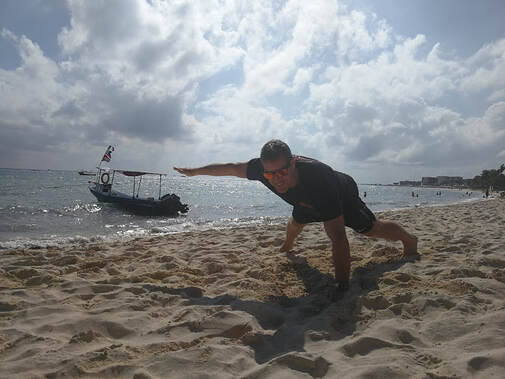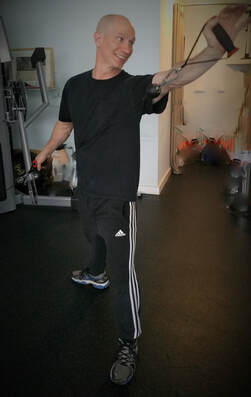 Ian Kelley recommends 300 minutes per week of physical activity to combat depression and anxiety.
Ian Kelley recommends 300 minutes per week of physical activity to combat depression and anxiety. One of the symptoms of both anxiety and depression is often an urge to stay in bed or lay on the couch and not move. Moving stirs up emotions that we are running away from.
And that leads to the theory: Much of depression and anxiety is caused by running away from emotions. In the case of anxiety, one panic attack at the mall can motivate a person to stay away from the mall for the rest of their life. That is the opposite of what is effective to cure anxiety. We have to encourage the anxiety to emerge slowly, bit by bit, and effectively process the anxiety. That is why your counselor will have you close your eyes and imagine being at the mall, experiencing anxiety. When you begin to sweat or shake, the therapist will ask you what you are thinking.
"I'm thinking about how I need to leave the mall immediately. I'm going to fall down in the mall, pass out, and embarrass myself. Everyone is looking at me."
Counselor: "Okay, that's good! Now we can start examining what is causing the anxiety. Let's start with how everyone is looking at you. What if the people who are looking at you want to help you?"
"No, they are laughing at me."
"But it is your fantasy. Nobody else is creating this fantasy. You can decide what you want it to be. How about trying to imagine that the people are kind and want to help you? Wouldn't you want to help someone who is having a panic attack?"
"Yes."
Another thing that is a circular cause of anxiety and depression is lack of physical activity. Our bodies were not designed to run around in automobiles and sit in chairs all day. We were designed to be active, running and walking barefoot, lifting, hunting, cultivating, etc.
My friend, Ian Kelley, has been a personal trainer for years. He says the ideal amount of time for a person to engage in physical activity is 300 minutes per week. That can be walking, dancing, exercising, weeding in the garden, cleaning the floors or the windows, etc. Our bodies automatically get depressed and anxious when we fall below that level of physical activity. It is not appropriate to take antidepressants and anti anxiety medications just to avoid exercising. First excercise, then see if you still medications. Ian has a personal training program that you can access online (I receive no commission from mentioning his program.) My friend, Peter Milhous is my personal trainer and he also has an online training website (also no commission for me).
Recent research at UVM indicates that taking 90-180mg of magnesium per day is as effective as taking one of the anti-depressant or anti-anxiety medications that is currently being prescribed. Magnesium is considered to be far more healthy for our bodies than anti-anxiety and anti-depressant medications, and has mostly healthy side effects. (If trial subjects got a stomach ache they reduced their magnesium in half, and it remained just as effective.) Magnesium is a nutrient that occurs in the foods that we eat, but it is supposed that our soil has been depleted over the years, so we need supplements to keep up with the way our bodies originally functioned.
In the documentary Super Size Me, the author interviewed an alternative school program administrator who stated that one of the main things they do for hard to control and hard to educate teens is to make sure they eat an organic lunch, heavy on leafy green vegetables and other vegetables. They found that just keeping them off of caffeine and fried salty foods made them instantly calmer, friendlier and more focused.
The most effective treatments for depression and anxiety are:
1. going for a 20 minute walk first thing in the morning without sunglasses.
2. Tai Chi for 45 minutes five days per week in a park with friends.
3. Gratefulness twice a week.
These activities combine meditation, exercise, sunlight, friends and sometimes music, all things that have been shown to ameliorate anxiety and depression.
Which of these suggestions can you see yourself enjoying?

 RSS Feed
RSS Feed
